Bajaj Auto’s Domestic Biz Registers Highest Ever Revenue
- By MT Bureau
- May 30, 2025
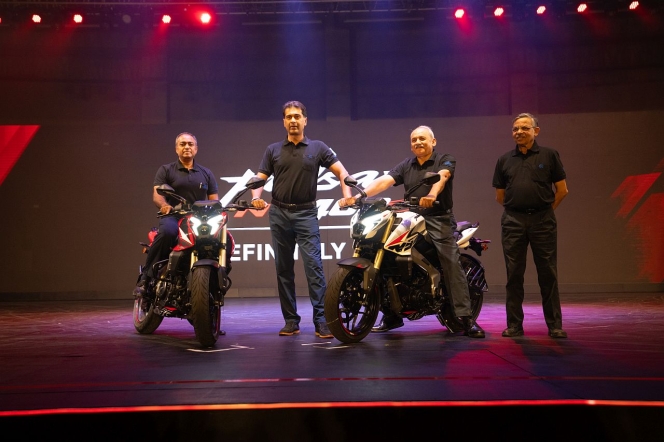
Reporting a revenue of over INR 500 billion for the first time, up 12 percent year-on-year, on the basis of automobiles are spares in FY25, Bajaj Auto Ltd has revealed that volumes rose seven percent YoY during the respective period with a strong performance in the first half and a relatively soft performance in the second half.
Observing a solid rebound (double digit volume and revenue growth) in exports, the Pune-based company earned an all-time high EBITDA of INR 101 billion, up 14 percent YoY. PAT also hit a new record at over INR 80 billion. With a revenue of around INR 55 billion from electric vehicles (20 percent of its domestic), the company, with a full PLI certified portfolio, underlined its organisation agility and adaptability with significantly improved unit economics in a journey spanning over the last three years.
With the refreshed Duke 200/250 and the new Adventure 390, the KTM portfolio of Bajaj Auto experienced strong momentum in FY25. Also the Triumph motorcycle portfolio with sales up 60 percent YoY. The KTM and Triumph motorcycles sold one lakh units domestically
The commercial vehicles portfolio of the company comprising mainly of three-wheelers saw a revenue increase of over INR 100 billion. It combined the tradition ICE vehicle business and the newly developed electric vehicle business. The launch of GoGo electric three-wheeler and a wide network of over 850 dealerships helped to increase the momentum.
Image for representative purpose only.
- BASF
- BASF Coatings
- Mark Gutjahr
- Chiharu Matsuhara
- Florina Trost
- Color Report for Automotive OEM Coatings
Green And Gray Emerge As Global Automotive Colour Preference For Consumers In 2025, White Remains Dominant In India: BASF
- By MT Bureau
- January 16, 2026
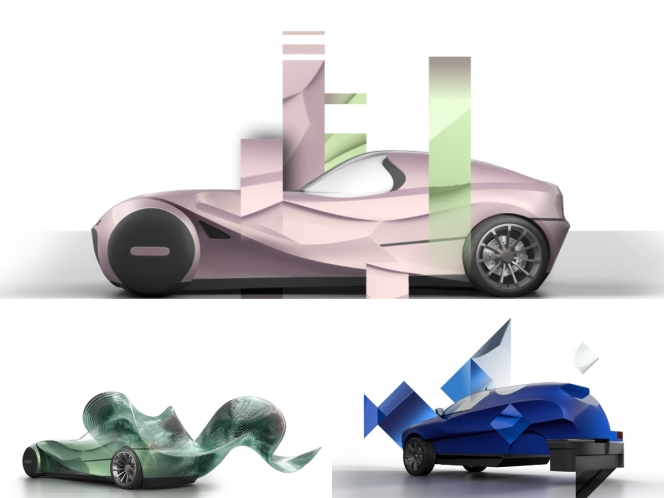
BASF Coatings has released its latest Color Report for Automotive OEM Coatings, revealing a shift in global vehicle colour preferences for 2025. The data indicates that green has become the fastest-growing chromatic colour, while gray has increased its share within the achromatic category.
The report finds that while white remains the dominant choice in India, there is a growing shift towards individual expression. Globally, the report identifies green as the fastest-growing chromatic colour and gray as a primary riser in the achromatic category.
According to the report, Indian consumers continue to favour white for its traditional appeal and resale value, yet nature-inspired aesthetics are gaining traction. Green now ranks among the top three chromatic colours globally, trailing only blue and red. While blue dropped by one percentage point and red declined to 3 percent of the total market, green continued a steady rise. Gray recorded an increase of two percentage points worldwide, whereas white saw a slight decline in other markets despite its stronghold in India. Solid finishes have also decreased globally, now representing 18 percent of the total market.
Florina Trost, Head of Design EMEA, BASF Coatings, said, “The green trend was already making waves in EMEA a few years ago. Different shades have been featured in our Automotive Color Trends collection, hinting at the huge variety of shades we see fitting to this movement today.”
The Americas showed an increase in chromatic paints by nearly two percentage points. While red and blue remain historically significant in this region, colours such as green, beige, brown and violet are gaining momentum.
Mark Gutjahr, Global Head of Automotive Color Design, BASF Coatings, said, “In 2021, brown and beige have been key colours of our trend collection. The sales now validate these early predictions and illustrate, how long-term trends continue to shape the market.”
In the Asia Pacific region, gray is trending upwards as white declines. Green is expanding its presence with a range extending from light tones to natural shades.
Chiharu Matsuhara, Head of Automotive Color Design for Asia Pacific, BAF Coatings, said, “In our past trend forecast, we have introduced a solid-like gray with subtle colour interference and highlighted an urban nuance green for adaptability. Today, gray strengthens while green expands across the region.”
- SIAM
- SIAM India
- Delhi Traffic Police
- Maruti Suzuki India
- Road Safety
- Prashant K Banerjee
- Vinay Dhingra
SIAM Conducts Road Safety Workshops For Drivers In Delhi
- By MT Bureau
- January 16, 2026

The Society of Indian Automobile Manufacturers (SIAM), in partnership with the Delhi Traffic Police and Maruti Suzuki India, has completed road safety refresher workshops in New Delhi. The sessions were organised as part of National Road Safety Month and targeted commercial vehicle and three-wheeler drivers.
The initiative, part of the ‘सुरक्षित सफर (Safe Journey)’ programme, involved over 200 participants. Workshops took place on 12 January 2026 at the Institute of Driving Training & Research (IDTR) in Loni/Burari and on 15 January 2026 at IDTR, Sarai Kale Khan.
The workshops provided health check-ups for drivers, including blood pressure, blood sugar, and eye examinations. Eyewear was distributed to drivers through support from the Eicher Group Foundation and Dr. Shroff's Charity Eye Hospital.
Following the medical checks, faculty from IDTR and the Delhi Traffic Police delivered training on traffic regulations, defensive driving, and on-road behaviour. The curriculum focused on safety messages through participant engagement and learning.
Prashant K Banerjee, Executive Director, SIAM, said, “Road safety is a shared responsibility, and sustained awareness among drivers is critical to reducing road accidents. Through our ‘सुरक्षित सफर" initiative, SIAM, along with its member companies and enforcement authorities, remains committed to promoting safer driving practices and strengthening road safety culture across the country.”
Vinay Dhingra, Vice-President, SAFE, said, “Drivers are the lifeline of our nation. It is through their hard work and dedication that we are able to support and strengthen our country. Consistent training and awareness programmes are crucial in building a strong culture of road safety. These initiatives equip drivers with a better understanding of traffic regulations, encourage safer driving habits, and help create safer roads for everyone.”
Officials from the Delhi Traffic Police and representatives from Honda Motorcycle & Scooters India also attended the sessions to interact with the drivers.
- SaveLIFE Foundation
- Piyush Tewari
- World Economic Forum
- Schwab Foundation
- 2026 Social Entrepreneur of the Year Award
Schwab Foundation And WEF Honour SaveLIFE Foundation’s Piyush Tewari With 2026 Social Entrepreneur of the Year Award
- By MT Bureau
- January 14, 2026

Road safety crusader Piyush Tewari, Founder and CEO, of SaveLIFE Foundation (SLF), has been named a winner of the 2026 Social Entrepreneur of the Year Award by the Schwab Foundation and the World Economic Forum.
Tewari is the sole awardee from India this year and will be honoured at the World Economic Forum Annual Meeting in Davos, Switzerland, on 20 January 2026.
Since 2008, SaveLIFE Foundation has operated as a scientific organisation focused on road safety and trauma care. The Schwab Foundation’s recognition endorses the foundation’s systemic approach to road safety, which addresses a leading cause of death globally. The foundation’s work supports the State’s obligation to provide safe transport systems, a right interpreted by Indian courts under Article 21 of the Constitution.
SaveLIFE Foundation has collaborated with governments and industry to implement science-based solutions. Its advocacy contributed to the Good Samaritan Law (2016) and the Motor Vehicle (Amendment) Act, 2019. Since 2015, the organisation has deployed Zero-Fatality programmes in ‘Corridors’ and ‘Districts’ across India.
These programmes utilise data analytics for ambulance deployment and engineering fixes, such as closing median gaps and installing crash barriers. The not-for-profit also applies tactical urbanism to redesign intersections for the protection of vulnerable road users, including pedestrians and cyclists. These interventions have resulted in a 30 percent to 60 percent reduction in road crash fatalities on target stretches. The Ministry of Road Transport and Highways (MoRTH) has recently directed states to implement these solutions nationally.
The foundation also focuses on the ‘chain of survival’ in post-crash response. At present, delays in medical attention contribute to 30 percent of road victim deaths. SavLIFE Foundation proposes a national framework for trauma care that includes standalone funding for the maintenance of emergency facilities and mechanisms for free, timely treatment to enable early stabilisation.
Piyush Tewari holds an MPA from Harvard University and received the Skoll Award for Social Innovation in 2024. He was appointed to the National Road Safety Council by the Government of India in 2019. Prior to founding SaveLIFE, Tewari was the Managing Director (India) of the Calibrated Group, a private equity fund.
New Product Launches, GST Bonanza Drives Automotive Wholesales Growth To 36% In December
- By MT Bureau
- January 13, 2026

The Indian automotive landscape is witnessing a sustained period of robust growth as the industry enters the latter half of FY2026. This momentum is being fuelled by a strategic double engine of favourable fiscal policy and aggressive corporate manoeuvring.
Industry analysts point to the recent reduction in Goods and Services Tax (GST) as a primary catalyst, significantly lowering the barrier to entry for consumers across multiple segments. Coupled with a feverish pace of new product launches, automakers are successfully stimulating replacement demand and capturing new market share. This synergy has resulted in a marked uptick in wholesale volumes, signalling a high-octane finish for the fiscal year.
As per the latest sales data released by the Society of Indian Automobile Manufacturers (SIAM), the apex body representing the automotive industry in the country, more than 2 million vehicles were sold in the last month of 2025, which marked a 36 percent YoY growth. During the period, passenger vehicle sales came at 399,216 units, up 27 percent YoY, three-wheelers at 61,924 units, up 17 percent YoY and two-wheelers at 1.54 million units, up 39 percent YoY.
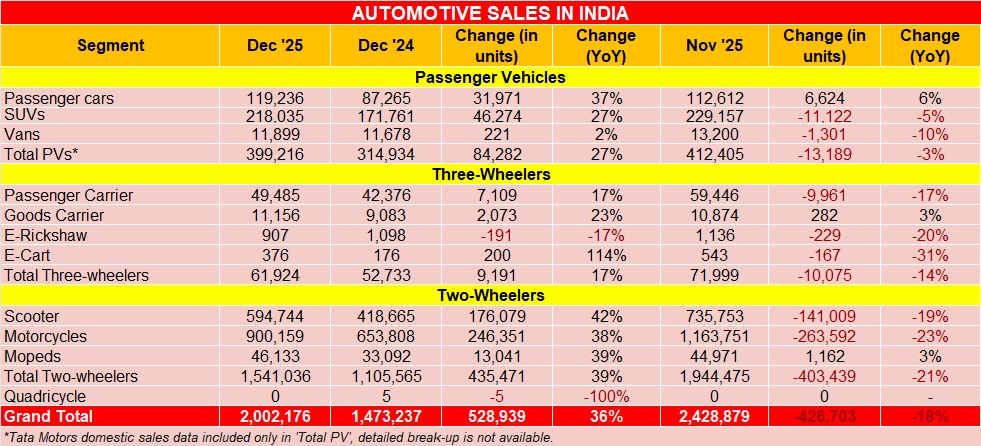 Furthermore, for Q3 FY2026, a total of 7.47 million vehicles were sold in the country, which was 18 percent higher compared to same period last year. The passenger vehicle segment led by SUV demand saw over 1.2 million units sold, up 21 percent YoY. Three-wheeler segment registered 14 percent YoY growth with 215,211 units wholesales.
Furthermore, for Q3 FY2026, a total of 7.47 million vehicles were sold in the country, which was 18 percent higher compared to same period last year. The passenger vehicle segment led by SUV demand saw over 1.2 million units sold, up 21 percent YoY. Three-wheeler segment registered 14 percent YoY growth with 215,211 units wholesales.
The commercial vehicle segment witnessed 22 percent growth with a total of 290,085 units sold, as compared to 238,666 units sold a year ago. Two-wheeler sales at 5.69 million units, registered a 17 percent YoY growth, as compared to 4.87 million units for the same period last year.
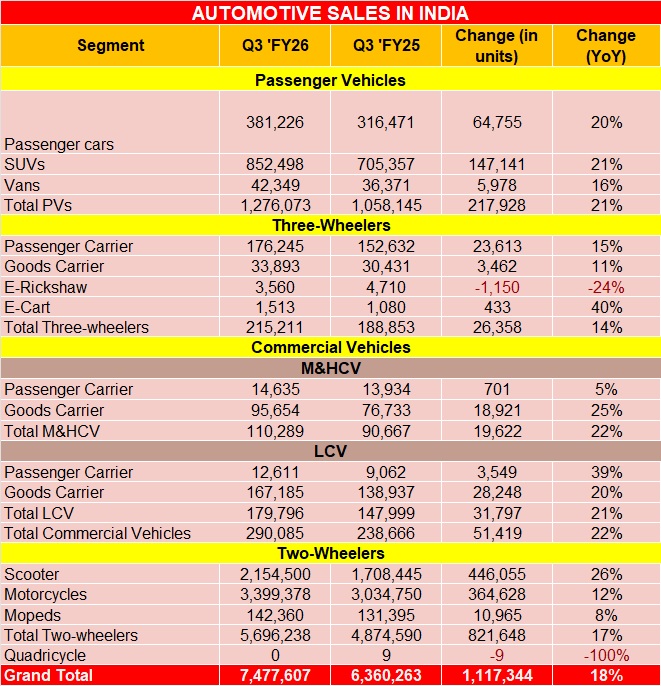
Shailesh Chandra, President, SIAM, said, “2025 has been a landmark year for the Indian Auto industry. The year began with a subdued first half, and the industry continued to navigate supply side challenges. With multiple structural policy reforms including the income tax relief, successive repo rate cuts and the rollout of GST 2.0 laid the foundation for a positive demand environment. The reduction of GST rates made vehicles more affordable and injected fresh momentum into the sector. Growth during the year has been broad-based across segments, with passenger vehicles, commercial vehicles and three-wheelers recording their highest ever sales and two-wheelers posting the 2nd highest sales ever, in a calendar-year.”
He further mentioned that two-wheeler sales crossed the 20-million-mark for the 2nd time in a calendar year with more than 20.50 million units wholesales, clocking 4.9 percent YoY growth in 2025.
“This was still behind the peak it had achieved in 2018. In addition, exports witnessed double-digit growth across vehicle segments in 2025, compared to calendar year 2024. Looking ahead, the industry expects the positive momentum to continue well into 2026, supported by stable macro-economic conditions, improving affordability and continued policy support. The industry will also continue to monitor geopolitical developments to ensure resilience in supply chain and export volumes,” said Chandra.
 - Ajaykumar illa
- Ajaykumar illaIt was nice information to the people got a knowledge into automotive. and very useful and helpful content related to automotive for buying the automotive vehicles in future like which one is better and design structure, accessories of the vehicles, speed of the vehicle, input and output parts of the vehicle, 3D design structure etc.Digital marketing services
Reply



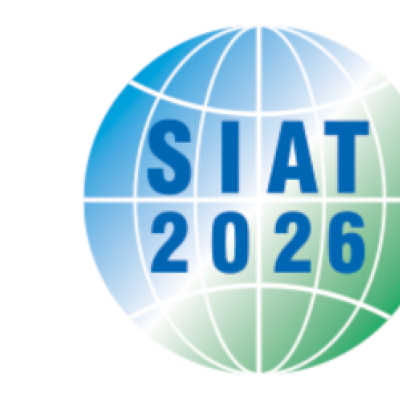



Comments (0)
ADD COMMENT